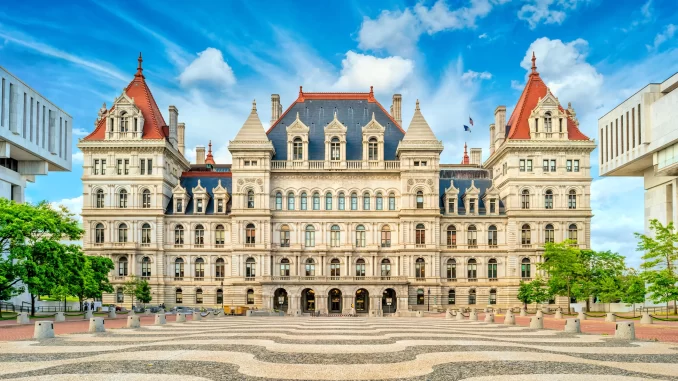
By Hank Russell
As Governor Kathy Hochul sent out a flurry of press releases announcing the number of bills she signed to be incorporated into the state budget, many GOP state legislators were disappointed in the final version that is now in the books.
On May 8, the state legislature passed Hochul’s $245 billion budget. Upon passage, Hochul continually made announcements of what was included in the budget. Among those items included were a $1,000 child tax credit, inflation refund checks of up to $400, changes to discovery laws, $347 million for gun violence programs, and mask bans, among others.
She was joined by a group of children as she signed the budget. “Today, and for the first time in state history, I joined kids to sign our budget into law,” Hochul posted on X (formerly Twitter). “That’s no coincidence – this budget is for them. For moms and dads. For families working to build a better life. I said I’d make New York safer and more affordable — we got it done.”
But many Republicans were not impressed. Assemblyman Keith Brown (R.C-Northport) decried the fact that the budget was over a month late and was loaded with runaway spending, namely double-digit increases in Medicaid spending and the inclusion of the MTA payroll tax increase to plug the agency’s $33.4 billion budget hole.
“In addition to its delay and bloated size, the final budget is a mixed bag, with both highs and lows,” Brown said. “The final state budget fails to present a clear path to affordability or long-term prosperity. Rather than easing the burden on taxpayers, the governor and Albany Democrats are accelerating the long-term economic decline of the Empire State.”
“Now the budget really is done and passed,” added Assemblyman Ed Ra (R-Franklin Square). “But when you’re spending a quarter of a trillion dollars of taxpayer money, it shouldn’t be too much to ask for transparency and a complete financial picture.”
But Brown found some bright spots in the budget, such as $8 billion to pay off the debt in the state’s unemployment insurance fund, making “long-overdue reforms” to the state’s discovery laws, the cell phone ban in schools, the child tax credit and the expansion of mental health and addiction services.
“However, these wins are overshadowed by troubling decisions. The $254 billion budget is $2 billion more than the governor’s original proposal, $13 billion more than last year’s budget and $77 billion more than when I first took office. Despite strong opposition, the final plan still includes a state takeover of Nassau University Medical Center. Meanwhile, priorities like funding for the Buffalo Bills and a Universal Hip Hop Museum take precedence over providing real financial relief to struggling families.
Assemblyman Daniel Norber (R,C-Great Neck) slammed Hochul for the “hollow gesture” regarding the mask ban. He said the measure establishes the crime of “evading arrest by concealment of identity” as a mere Class B misdemeanor and does little to deter individuals who use masks to conceal their identities while targeting Jewish communities with impunity.
“I am deeply disappointed by the governor’s so-called ‘crack-down’ on masked criminality, which amounts to nothing more than a slap on the wrist,” said Norber. “This law is not the public safety victory she claims, it is a hollow gesture that leaves Jewish New Yorkers vulnerable to continued harassment and intimidation. The Class B misdemeanor charge for wearing a mask to evade arrest during serious crimes is woefully inadequate and hardly a deterrent. This is an invitation for bad actors to persist.”
“Gov. Hochul’s victory lap on this issue is a betrayal of the communities she claims to protect. Jewish New Yorkers are reeling from a surge in antisemitic incidents and deserve more than political posturing,” Norber continued. “This law’s lenient penalty and vague enforcement guidelines send a clear message that the safety of vulnerable communities is not a priority. The governor’s failure to push for a stronger, stand-alone crime of masked harassment is a missed opportunity to stand against hate.”
Brown offered a conclusion about the budget. “In the end, it was not worth the wait.”

